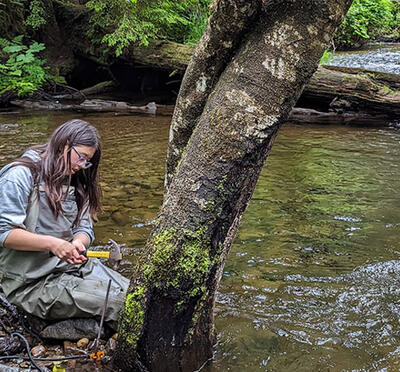Two engineering graduate students at Oregon State University and one recent alum have been selected as fellows in the National Science Foundation Graduate Research Fellowship Program.
The five-year fellowship includes three years of financial support, including an annual stipend of $34,000 and a cost-of-education allowance of $12,000 to the institution. The program recognizes and supports outstanding students in NSF-supported science, technology, engineering, and mathematics disciplines who are pursuing research-based master’s and doctoral degrees. Only 10% of applicants receive fellowships.
Melanie Huynh, B.S. bioengineering ’21, will begin pursuing her doctorate in chemical engineering in the fall at the University of California, Berkeley. Working extensively with her mentor Cory Simon, assistant professor of chemical engineering, she has co-published three papers, including one as first author, on metal-organic frameworks for gas storage and separation. Huynh envisions using MOFs to deliver insulin to diabetics orally, like a vitamin, as an alternative to injections.
“Diabetes affects nearly 35 million Americans, with treatment costing over $9,500 in medical expenses per patient annually,” Huynh explained. “Daily insulin injection remains the most common treatment method, which many find painful and inconvenient. Drug-delivery MOFs may solve this.”
Huynh aims to use molecular simulations coupled with supervised machine learning techniques to create an efficient model that predicts insulin selectivity in biocompatible MOFs. The results will guide the design of successful insulin-storing materials, cutting down on time and cost.
Beyond contributing to research in chemical engineering and computer science, Huynh seeks to expand opportunities in STEM for students from minority communities, attributing her own undergraduate success to encouragement from mentors and networking with College of Engineering students and professionals.
“The NSF funding will help me further my career as an academic and allow me to provide exciting STEM opportunities to traditionally underrepresented communities,” she said.
Ethan Copple is pursuing dual master’s degrees, in industrial systems engineering and applied anthropology. In 2018, he researched health care access in Guatemala, blending systems engineering tools with ethnographic insights to discover hidden, yet crucial, complexities. This experience propelled him to seek NSF funding to support his career goal of systems consulting to identify and solve problems in health care and beyond in international development contexts. Copple says his motivation also stems from the Catholic social principle of aiding the poor and vulnerable, and from his father’s career as an engineer in the nonprofit sector.
“I’ve always been interested in humanitarian applications of systems engineering,” Copple explained. “One of my undergraduate mentors, Dr. Jessica Heier Stamm, has done much work with humanitarian and public health logistics systems, showing me how my technical skills could be applied outside of industry.”
Now that he has received NSF funding, Copple is considering his long-term options.
“The NSF award has reoriented a number of my future plans. I’m evaluating Ph.D. opportunities and looking at a few different future visions with my advisors to see what paths and timelines make most sense,” Copple said.
David Evitt will soon earn his master’s degree in mechanical engineering, advised by Nordica MacCarty, associate professor of mechanical engineering. He will remain at Oregon State for his doctorate, starting in the fall with advisors MacCarty and David Blunck, associate professor of mechanical engineering. Evitt hopes to bridge “cutting-edge combustion science and practical implementation” by developing cleaner biomass-fueled cookstoves. Biomass is the primary energy source for an estimated 3 billion people around the world, concentrated mostly in rural areas in low- and middle-income countries.
“Affordable, high-performance appliances delivering robust emissions reductions are needed for biomass to take on an expanded role as a low-carbon fuel in the U.S. and in resource-constrained settings around the world,” Evitt said.
Evitt’s interest in humanitarian engineering started when he worked for a nonprofit organization in Guatemala following his undergraduate education, aiding rural families with technology solutions. Later, he co-founded a clean cookstove manufacturing business and helped finalize the Jet-Flame design at Aprovecho Research Center, where he has worked for three years. His NSF funding supports his ongoing mission to help build basic infrastructure for a sustainable world.
“My Ph.D. research will apply advanced combustion diagnostics, exploring how injected turbulent air jets interact with wood logs to influence the combustion process and emissions formation,” Evitt explained. “Assuring super-clean combustion with fuel of varying properties over different operating conditions is an exciting engineering challenge that can benefit many.”
Nordica MacCarty, who works with both Copple and Evitt, both of whom are Evans Fellows, knows their research fellowships will benefit society through engineering.
“The fact that two graduate students in Oregon State’s small humanitarian engineering program are NSF Fellows speaks to the caliber and commitment of the students we have been able to attract, as well as the relevance of engineering for social good in the eyes of NSF,” MacCarty said. “These students bring their rich experience and interdisciplinary approach to work on problems like burning wood more cleanly so that it remains a viable, affordable, and sustainable fuel; and applying a systems approach through a social science lens to bring health care access to underserved populations.”



